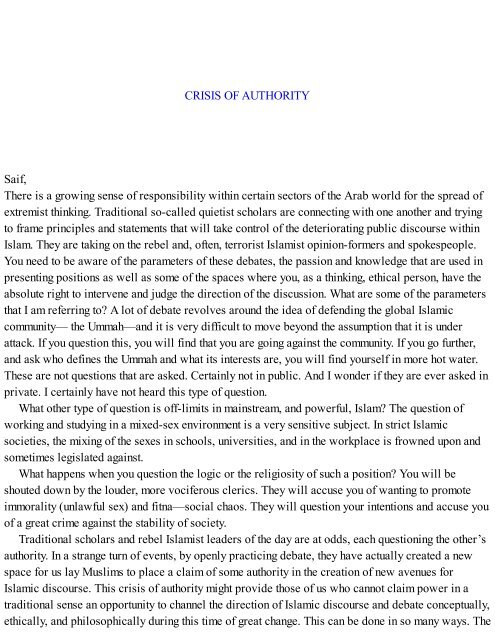1250119847
You also want an ePaper? Increase the reach of your titles
YUMPU automatically turns print PDFs into web optimized ePapers that Google loves.
CRISIS OF AUTHORITY<br />
Saif,<br />
There is a growing sense of responsibility within certain sectors of the Arab world for the spread of<br />
extremist thinking. Traditional so-called quietist scholars are connecting with one another and trying<br />
to frame principles and statements that will take control of the deteriorating public discourse within<br />
Islam. They are taking on the rebel and, often, terrorist Islamist opinion-formers and spokespeople.<br />
You need to be aware of the parameters of these debates, the passion and knowledge that are used in<br />
presenting positions as well as some of the spaces where you, as a thinking, ethical person, have the<br />
absolute right to intervene and judge the direction of the discussion. What are some of the parameters<br />
that I am referring to? A lot of debate revolves around the idea of defending the global Islamic<br />
community— the Ummah—and it is very difficult to move beyond the assumption that it is under<br />
attack. If you question this, you will find that you are going against the community. If you go further,<br />
and ask who defines the Ummah and what its interests are, you will find yourself in more hot water.<br />
These are not questions that are asked. Certainly not in public. And I wonder if they are ever asked in<br />
private. I certainly have not heard this type of question.<br />
What other type of question is off-limits in mainstream, and powerful, Islam? The question of<br />
working and studying in a mixed-sex environment is a very sensitive subject. In strict Islamic<br />
societies, the mixing of the sexes in schools, universities, and in the workplace is frowned upon and<br />
sometimes legislated against.<br />
What happens when you question the logic or the religiosity of such a position? You will be<br />
shouted down by the louder, more vociferous clerics. They will accuse you of wanting to promote<br />
immorality (unlawful sex) and fitna—social chaos. They will question your intentions and accuse you<br />
of a great crime against the stability of society.<br />
Traditional scholars and rebel Islamist leaders of the day are at odds, each questioning the other’s<br />
authority. In a strange turn of events, by openly practicing debate, they have actually created a new<br />
space for us lay Muslims to place a claim of some authority in the creation of new avenues for<br />
Islamic discourse. This crisis of authority might provide those of us who cannot claim power in a<br />
traditional sense an opportunity to channel the direction of Islamic discourse and debate conceptually,<br />
ethically, and philosophically during this time of great change. This can be done in so many ways. The
















